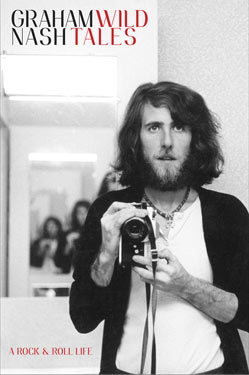The Shrewsbury Lantern - Review: Graham Nash – Wild Tales – A Rock & Roll memoir like no other
SHREWSBURY, Massachusetts – It was Britain, late in the winter of 1942, with millions of citizens living under constant threat of German attack. Pregnant women nearing delivery were shipped from areas around major cities like Manchester to the safer settings such as Blackpool in order to give birth, after which these mothers and their newborns were promptly sent back home to the bombing area. An interesting notion, to be sure, but it was in this very setting that Graham William Nash would be born, and in many ways, his presence would ultimately come to define much of the second half of the 20th Century, and continue to do so to this very day.

I would seem obvious to even the casual observer that an autobiography of one of the biggest rock stars in history it would probably be a book replete with tales of sex, drugs, and rock and roll; a book laden with stories of decadences and dalliances, and of living life to the excess. Well don’t worry, Nash pulled no punches here, and those stories all there for the taking. Still, this book is about so much more than that. In the end Wild Tales is about the music transcending all else, but more so about people, family, and most of all about LOVE, FRIENDSHIP and LOYALTY. I picked up the book and was literally transfixed for hour after hour, unable to put it down until I got to the last of it’s 360 pages before starting again from the beginning. I laughed, and I cried, over and over again, learning as much about love as I learned about loss. The stories were just so mesmerizing, and seemed to flow so naturally, that for that one brief moment I was transported back in time and witnessing first hand the seemingly cathartic retelling of the most amazing events in musical history cloaked in the wrapper of a life lived with honor, integrity, caring and commitment, by someone who may well have been one of the few islands of saneness in a generation where sanity was hard to come by.
Interspersed with stories of love triumphing over all, we are taken to the places all of us may wish we could have been, as Nash lays down a historical record for us, and for future generations, of glimpses into musical history, many of which had never before been documented. We learn how with the support of his parents, a young man growing up in abject poverty, wasn’t allowed to fall into the trap of many of his peers, working in the mills or the mines, and was instead allowed to pursue his passion for music. We learn later on in the book just why that was the case.
“When I was back in England, I went to visit my mother, whose health had been in a steady decline. “ “…I’d been carrying around a question for 25 years that my mother could only answer with some serious reflection. I wanted to know why all of my friends had been forced to get a real job when they turned 16, and I’d never gotten that pressure, especially from my mom.” Because, Graham,” she said, “you are living the life I wanted for myself.” She said, “Believe it or not, I thought I had a pretty nice voice and wanted to be on stage, to be a singer like you. I thought I had something to offer with my talent. But World War II came and I married and had three kids – and the dream was over for me. So you are doing what I wanted to do.”
“A few years later, after my mother had passed, I found myself describing this conversation one night while Crosby and I were playing Carnegie Hall.” “My mother wanted to be on the stage,” I said, “and I thought how great it would be if she had made it to Carnegie Hall. As I spoke, I reached into my right-hand pocket, into which I had slipped a few of my mothers ashes, and I started to sprinkle them on the stage.” “Mom, you finally made it!”
We learn about the lifelong relationship Nash would have with artists such as the Stones, Eric Clapton, Mama Cass, The Everly Brothers, and of course, the Beatles.
“On Sunday morning, June 25, 1967, I was awakened by a phone call at my house in Kynance Mews…not my favorite way of waking up, but still I sleepily answered it. It was Paul McCartney, and I was awake immediately. Paul invited me down to Abbey Road, where he and the boys were about to put on a live show for the whole world. Using the new Telstar satellite, and the BBC, the Beatles were going to be singing a song (All You Need is Love) representing the best that Britain had to offer.” It was going to be the first worldwide television show – broadcast to some 400 million people.”
The most amazing tales however were those that transcended music itself, and really just spoke to the true meaning of friendship. We learn how Nash’s love for his musical partner David Crosby, would lead to his spear-heading an intervention to save him from the drugs that took so many others, way too young. How when David seemed to have lost it all, Graham stepped in and bought up his publishing rights, to protect them from creditors, and how he took his dear friend, despondent and nearly suicidal over the death of Christine Hinton, and got him away from the madness and out onto the open seas in David’s boat, The Mayan, an effort that no doubt saved his life.